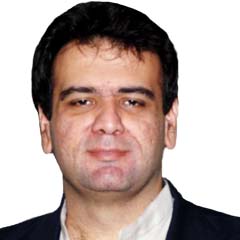Yesterday was the anniversary of the Army Public School (APS) attack. We are still all grieving the massacre of the 144 innocent souls who were killed in the ultimate act of savagery by terrorists. This act of terror became an act that decisively shook the nation and forced the state and its key functionaries to act against the menace of militancy but such incidents of terrorism have not been new to our land. They are the culmination of an age-old mindset that became accelerated after permeating dangerously into the state under Ziaul Haq’s regime and there has been no looking back since. Month after month stories emerge that show us how deeply entrenched this ideology has permeated in our state functions and national power centres both public and private.
There have been assassinations of political leaders. There have been attacks on armed services’ installations with insiders’ help. There have been attacks on prisons leading to the freeing of the militants, again with insider help. There have been media manipulations to create sympathy for this terrorist mindset. There comes street mobilisation to defend and nurture this ideology. And there is the continuous creation of confusion and chaos through the media, academia and clergy that has brainwashed generations of affectees. Have we forgotten major political leaders, prominent bureaucrats writing for newspapers and media persons shedding tears to sympathise with terrorists before and during the Swat operation? Have we forgotten those who would tell to us day in day out that this is not our war, till December 16 and the APS attack happened, which shook us all out of our deep slumber? And is it not the case that as the dust of time settles over the APS incident, we have started hearing the same sympathetic voice again, albeit faintly to begin with? Is Ayyan Ali getting more media time and attention than the existential threat to the nation a mere coincidence or thought through divergence?
All this tells you about the penetration of an ideology when the killer of a governor is hailed by lawyers and ex-judges, when the government’s action to stop discrimination against a religious community by a major market is faced with resistance by traders’ unions and when the vice chancellor of the country’s largest public university intervenes to have suspected extremist elements of a banned outfit released. This ideology of hate, of xenophobia, of a certain moral supremacy and of brutality is still here and if signs are anything to go by, in undercurrents, it is still growing.
Like all men in power, Zia and those around him were ideologues and power maniacs at the same time. Their actions served both. There were commercial and power interests aligned with them, interests that may not have been ideologues but benefited enormously from the unleashing of this ideology. But, in it, they did initiate a snowball that engulfed the country, its modes of public communication, its modes of education and, above all, its state machinery. It brings one’s mind to the horrors of the third Reich, a white supremacist ideology that linked patriotism and sense of purpose to the glory of the ideology and legitimised the use of all means, no matter how cruel, for the ideology.
And that brings us to the question of whether we are living under our own third Reich. The answer is probably no. For the state, despite all its failings, is far from the horrors and cruelty of Nazi Germany. But this cannot be solace enough. For Nazism was not born overnight. It took a long time, from Volkisch nationalism to anti-Semitism to gas chambers and the horrors of Second World War. In the process, the theory did support vested commercial and power interests. And when the euphoria ended, it turned out to be a chapter in German history of which Germans are not proud of. The German nation’s good conscience finally redeemed itself but the price that Germany, the world and humanity paid was mammoth. So just when we may not be living under a third Reich yet, we unfortunately are on the same slippery slope. And despite our National Action Plans and military and policing solutions, and utmost sincerity of quite a few on top we are far from reversing the tide for two reasons. One, we are not yet ready to tackle the ideology on the level of its narrative. And, two, the elements that have permeated the organs of state and powers (both public and private) still hold enough sway to create divergences and confusions. Turning this tide requires an awakening that comes from clarity of thought and a bold resolve. Short of that we are only blocking the tide temporarily without doing anything to turn it away. May there be peace.
The author can be reached on twitter at @aalimalik
